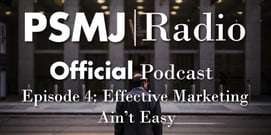 In PSMJ Radio's March 16th podcast, Matti Oberg and I discussed the difference between branding and marketing.
In PSMJ Radio's March 16th podcast, Matti Oberg and I discussed the difference between branding and marketing.
Generally speaking, architecture and engineering firms don’t have a clear understanding of the difference between branding and marketing for professional services firms.
Simply put, the brand is the DNA of your firm – it’s what people say and think about your organization; particularly as related to the firms’ positioning in the marketplace and its value proposition. A brand is a complex organism; the messages associated with a brand are just as important as the visual queues, although the logo tends to be the most recognizable aspect dimension of a brand.
Marketing is the strategic awareness-building for a said product or service. As described by Peter Drucker, the founder of modern management, “The aim of marketing is to know and understand the customer so well the product or service fits him and sells itself.” The goal of marketing is to open doors to the business development conversation. It’s throughout that conversation that the prospect should see themselves working with the firm at hand.
Can you have a brand without marketing? Can you market without a brand?
Yes and no. Every organization has a brand, whether it’s intentional or not. Even if steps have not been taken to shape that brand, your firm still has one. Whether it’s a 100-year-old architecture firm or a 10-year-old construction firm, all firms have a brand even if they never intentionally focused on defining that brand.
For most firms, the challenge comes in the lack of attention given to their brand at the onset of the firms’ creation. It’s only after some years that branding becomes a point of conversation. On the other hand, marketing is having a dialogue with target audiences. Creating conversations around value and the brand becomes symbolic of the reputation, expertise and overall brand strength of a firm.
A greater disconnect occurs around understanding the role of marketing vs. business development. But Why? It helps to understand a bit about human behavior. In product sales, it’s much easier to highlight features and benefits. When it comes to services, the conversation shifts to individuals, with varying personalities, technical expertise and relevant experience. Characteristics that are not quite as obvious when it comes to marketing and characteristics that may appear much like that of any other must be crafted in differentiated manners to successfully connect with buyers, in a meaningful way.
For professional services, the premise has always been “If I do a good job, I’ll get more clients, I’ll get referrals. Just need to keep my head down and I’ll get more work.” Traditionally, the road to new work was doing good work. As times have changed and the rise of the digital buyer has grown, the traditional ways no longer fit. Through strategic business development, firms can help target audiences, those prospects, understand the value the firm can bring to an engagement. In essence, why they are a good fit!
The evolution of marketing for A/E/C firms.
Consider the following facts:
-
Generational shift in business and A/E/C industry is in the thick of it.
-
Seasoned practitioners that established most firms are retiring, along with their peers and contacts.
-
Multiple recessions caused a void in middle management that could now be poised to take leadership reigns. Thus, leaving many firms without proper succession plans.
-
Geographic limitations no longer an issue – buyers of services want to work with the best, regardless of location.
-
Talent wars are at their peak.
-
Online accessibility provides a radical change to how information is consumed.
-
Individuals are predisposed to self-educating – even when it comes to issues and topics relevant to their business. Everyone is doing his or her own level of research.
-
The traditional growth engine aka referrals have also evolved with online accessibility. Referrals are vetted online.
From our primary research, we know that 80% of buyers check out your website at some point in the buying process, but an eye-opening 52% of the time, a referred prospect never reaches out to your firm because your firm’s website did not match what they had heard from their trusted colleague! Knowing that referrals are vetted online makes the rise of online/digital marketing even more important.
For all of the reasons above, there is a revolution related to how buyers of professional services seek out providers. Online presence is at the forefront and for firms rejecting this new reality, their existence is questionable.
 About the Author: Sylvia Montgomery, CPSM, has over 25 years of experience combining her visual communications training with practical marketing planning and execution. Her experience includes over a decade of working in and with the A/E/C industry, where she is a recognized Visible Expert℠. As a senior partner at Hinge, Sylvia is in charge of Hinge’s A/E/C practice, developing new business, and creating marketing and branding strategies for clients. Connect with her on Twitter @BrandStrong or via email at smontgomery@hingemarketing.com.
About the Author: Sylvia Montgomery, CPSM, has over 25 years of experience combining her visual communications training with practical marketing planning and execution. Her experience includes over a decade of working in and with the A/E/C industry, where she is a recognized Visible Expert℠. As a senior partner at Hinge, Sylvia is in charge of Hinge’s A/E/C practice, developing new business, and creating marketing and branding strategies for clients. Connect with her on Twitter @BrandStrong or via email at smontgomery@hingemarketing.com.



